
<<
Back
Of
the major religious organizations on campus in the early 20th century
the YMCA and the Student Volunteer Movement had disappeared before
the Second World War, while the YWCA lingered on another decade
or two before fading from view. In their place were the denominational
clubs and programs sponsored by various local churches, especially
Gobin Memorial Methodist Church, in a time when Methodism still
remained the largest single religious preference among DePauw students.
The Rev. John Tennant, pastor of Gobin in the 1940s, was especially
active in organizing and supporting the work of the Methodist Student
Movement and assigned an assistant, Barbara Daniels, as official
adviser of the group. Among her successors as advisers or directors
of the MSM, known later as the Methodist Student Federation and
finally as the Christian Action Movement, were Patricia B. Kyle
(1950-1954), Kermit B. Morrison (1954-1958), John Dorr (1958-59),
Jack T. Hanford (1959-60), Samuel Kirk (1961-66), and Donald E.
Bossart (1967-70). In 1967 the Indiana Methodist conferences financed
the construction of a modernistic aluminum-and-glass building in
the rear of Gobin Church to serve as the University Christian Center.
Later reverting to the use of the church and its congregation, it
has been renamed Wesley Hall.
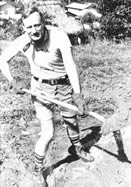 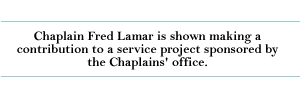
In the meantime Orville L. Davis, a former Methodist missionary
in India who had been a member of DePauw's department of religious
education since 1946, was named director of church relations in
1952 with the additional responsibility of coordinating religious
activities on campus through the interdenominational Council on
Religious Life. Finally, in 1962, after a brief hiatus following
the death of Davis, President Russell Humbert appointed Elmer E.
Carricker to the newly created post of university chaplain. Carricker,
a DePauw alumnus who had served as a military chaplain during the
war, carried on the somewhat vaguely defined duties of that office
until 1967, when he resigned to accept the vice presidency of Baker
University.
The next year President William Kerstetter named to the vacated
chaplaincy Marvin E. Swanson, who had graduated from Simpson College
during Kerstetter's presidency there and earned an S.T.B. and Ph.D.
from Boston University. One of Swanson's tasks was to define the
chaplain's role on campus, especially in relationship to the director
of the Methodist Christian Action Movement. A continuing responsibility
was the organization of the university's weekly chapel services
and such programs as the annual Mendenhall Lectureship.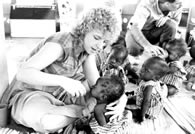

In 1971, however, Swanson accepted the additional post of director
of international studies. By 1973 it was clear that one person could
not perform the duties of both offices simultaneously, and the state
conferences of the United Methodist Church were approached with
a request for assistance in funding a full-time chaplain at the
university. The result was the appointment of William Fred Lamar
as university chaplain in 1974. Under Lamar, a graduate of the University
of Alabama with a B.D. from Eden Theological Seminary and Ph.D.
from St. Louis University, the chaplaincy took on both an interdenominational
and a Methodist character. Headquarters was established at first
in the Methodist conference-financed University Christian Center.
Later its activities were transferred to Locust Manor and then to
the present location in O'Hair House.
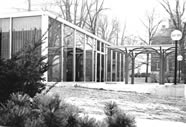 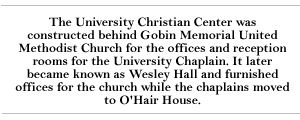
Through the Chaplain's Living Unit Council, the social service program
was particularly expanded, with student work projects initiated
in the community, nation, and many parts of the Third World. Under
Chaplain Lamar's direction the popular Winter Term in Mission program
has taken approximately 1450 students on 61 different projects,
providing health services and constructing church buildings and
other facilities in various sites in Central America and the Caribbean,
Africa, and the Philippines during the past decade. Since 1977 a
series of assistant chaplains has been appointed to help carry on
the increased functions of the office, including Mary Stubbs, James
B. Lemler, Bruce R. Coriell, Terence Jones, and Kevin B. Armstrong.
Currently the chaplain's staff also includes a chaplain intern and
two retired professors from the philosophy and religion department
on a part-time basis. Providing continuity to the office since 1958
has been its efficient secretary, Frances O'Neal.
Back
to Top
<<
Back
|







